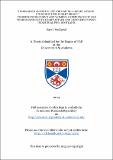Files in this item
"I wasnae on anyone's list for haeing a heart attack. I thought I wis bullet proof!" : understanding men's and women's experiences of and their responses to heart attack and recovery in post-industrial Fife, Scotland
Item metadata
| dc.contributor.advisor | Dibben, Chris | |
| dc.contributor.advisor | Kesby, Mike | |
| dc.contributor.author | McGarrol, Sarah | |
| dc.coverage.spatial | xi, 297 leaves | en_US |
| dc.date.accessioned | 2017-08-04T13:00:14Z | |
| dc.date.available | 2017-08-04T13:00:14Z | |
| dc.date.issued | 2014 | |
| dc.identifier.uri | https://hdl.handle.net/10023/11375 | |
| dc.description.abstract | Coronary heart disease (including heart attacks) is a major cause of mortality and morbidity and within the UK the highest rates of CHD are observed in Scotland. Geographical health inequalities are observed for CHD and this continues to be a policy priority for government. Place effects exist for understanding health variations but there is uncertainty about how place shapes lives and influences individual behaviour. This mixed methods thesis evolved from a largely quantitative study initially interested in measuring geographical variations of CHD outcomes in Fife, to a primarily qualitative study. Fifty participants were interviewed to illuminate how they constructed their heart attack and recovery experiences. Recovery from the heart attack was explored in relation to cardiac rehabilitation, a programme designed to improve health after heart attack. Additionally, interviews were conducted with eight NHS Fife cardiac staff involved in cardiac rehabilitation. Often research into CHD (and heart attack) has primarily focused on symptoms, risk factors and treatment and there is a limited amount of qualitative research exploring men’s and women’s experiences of heart attacks and/or recovery in place. Experiences of and responses to heart attack take place within the wider social contexts where people live their lives, therefore it was important to situate these experiences in and through place. Places are socially constructed and beliefs about health, ill health and heart attacks are influenced by social, historical and local contexts. The findings indicated that a heart attack is an often disruptive experience with physical, emotional and psychological consequences. Participants attempted to ‘make sense’ of their heart attack in myriad ways and the impact and consequences which the heart attack produces for participants’ day to day lives suggested that heart attack and recovery are experienced in different ways for men and women from different social locations in Fife. Additionally, places produce opportunities and obstacles for health, ill health and recovery and specific barriers to engagement with cardiac rehabilitation were found including organisational, infrastructural, situated and gendered experience factors. This thesis explores the complex interaction between gender, health and place with regards to how heart attack experiences and recovery are influenced and shaped within Fife, Scotland. | en_US |
| dc.language.iso | en | en_US |
| dc.publisher | University of St Andrews | |
| dc.subject.lcc | RC681.M3 | |
| dc.subject.lcsh | Heart diseases in women--Scotland--Fife. | en |
| dc.subject.lcsh | Heart diseases in men--Scotland--Fife. | en |
| dc.title | "I wasnae on anyone's list for haeing a heart attack. I thought I wis bullet proof!" : understanding men's and women's experiences of and their responses to heart attack and recovery in post-industrial Fife, Scotland | en_US |
| dc.type | Thesis | en_US |
| dc.type.qualificationlevel | Doctoral | en_US |
| dc.type.qualificationname | PhD Doctor of Philosophy | en_US |
| dc.publisher.institution | The University of St Andrews | en_US |
This item appears in the following Collection(s)
Items in the St Andrews Research Repository are protected by copyright, with all rights reserved, unless otherwise indicated.

